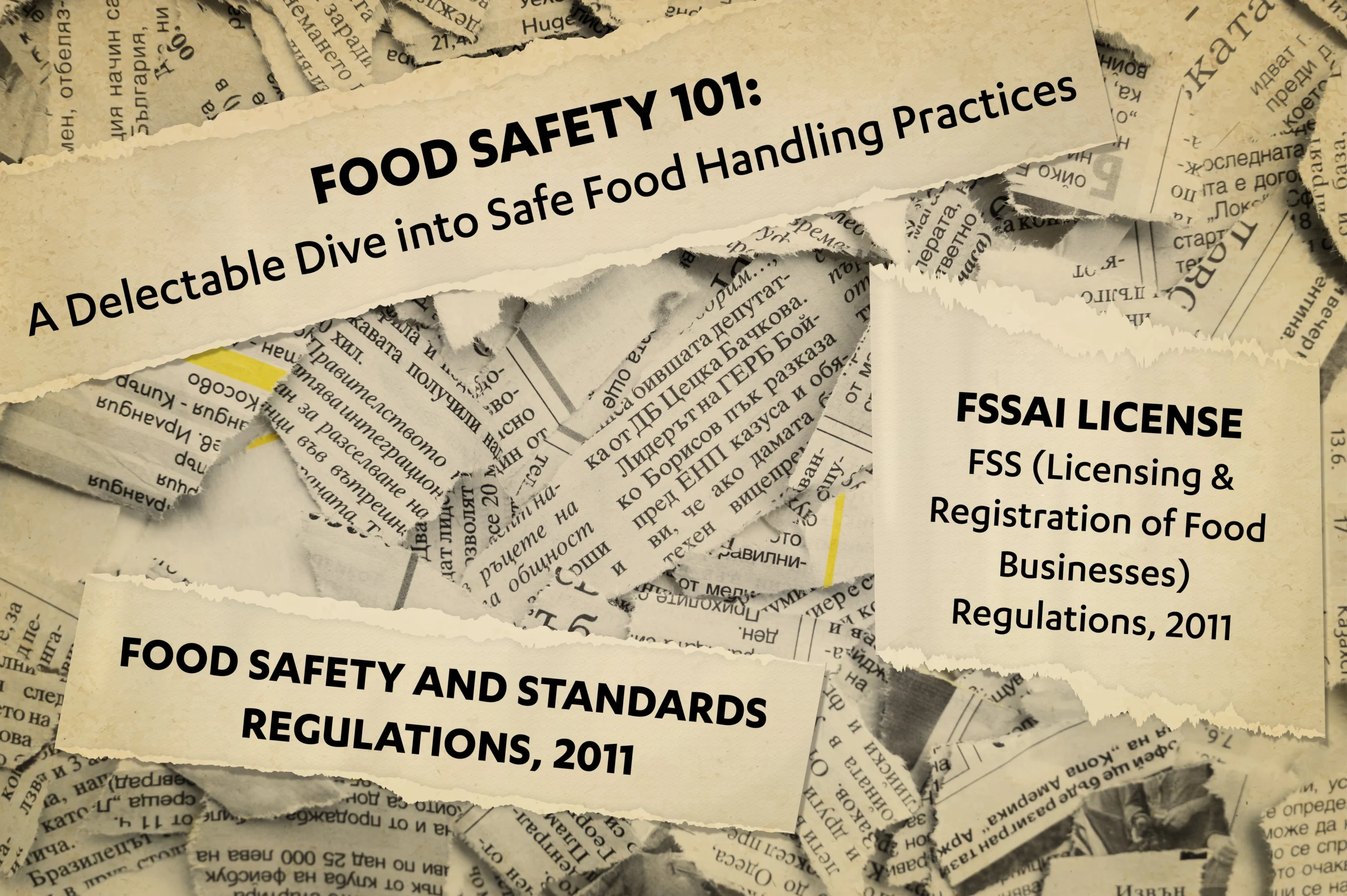Food Safety 101: Rules & Regulations for Food Service Operators
When it comes to food preparation, it’s like a beautiful dance in the kitchen – the steam, the sizzle, and the symphony of flour. But amidst all the deliciousness magic, we can’t forget about the potential risks of foodborne illness. Whether you’re a home cook or a professional chef, understanding food safety is crucial.
In this tasty journey, we’ll explore the world of food safety – where knowledge is key, and a clean kitchen is queen. We’ll touch on the standards set by the Food Safety and Standards Authority of India (FSSAI) and sprinkle in some practical advice and resources. So, whether you’re cooking for a small gathering or a big crowd, you can do it safely and deliciously.
Importance of Food Safety
Before you put on your apron, it’s important to understand why we need to prioritize food and hygiene. Foodborne illnesses are a real threat, with thousands of reported cases each year. This not only affects public health, but it can also have serious economic results for businesses, including costly recalls and damaged reputations.
By implementing proper food safety measures, we can have peace of mind knowing that the food we serve not only tastes good but also promotes good health. Taking a proactive approach in this area can help us build a loyal customer base, showing that we prioritize their well-being above all else. So, let’s embrace the basics of food safety and create a safe and enjoyable dining experience for everyone.
Government Guidelines: FSSAI Regulations by Food Safety Department
The FSSAI, India’s top authority on food safety and standards, lays down the law (quite literally) when it comes to handling, preparation, and storage of food. These standards are designed to prevent food contamination, a leading cause of foodborne illness.
As a food service operator, you are the guardian of these guidelines. Alongside achieving your FSSAI license or registration, it’s important to be aware of any updates or changes in legislation that could affect your day-to-day operations. Let’s go through some of the fundamental regulations:
FSS (Licensing & Registration of Food Businesses) Regulations, 2011
These regulations are all about making sure that food businesses are licensed and registered to guarantee the safety and quality of the food we consume. They cover things like who can qualify for a license, how licenses are issued and renewed, and the responsibilities that food business operators must meet.
Food Safety and Standards Regulations, 2011
These regulations cover a wide range of things, from everyday necessities to packaging and labeling. They work together with the FSS (Licensing & Registration of Food Businesses) Regulations, 2011 to create a strong framework for ensuring food safety in the country. Here’s an overview of key provisions:
Applicability Act:
These rules are like a superhero cape that covers all food businesses in India – from the bustling kitchens of manufacturers to the cozy corners of retailers. Everyone’s in the food safety squad!
Licensing and Registration:
Picture this: a carnival of food businesses! We’ve got three cool rides – FBOs needing a license, those opting for registration, and a special lane for the exempt ones. It’s a foodie fiesta!
Eligibility for License:
It’s the VIP pass for the big players! If you’re in the manufacturing, processing, packaging, storage, distribution, transportation, or import of food, you’re on the license guest list.
Eligibility for Registration:
Small-scale champs, petty retailers, and cottage industry magicians – the registration door is wide open for you! It’s the backstage pass to the foodie show.
Application Process:
It’s as easy as ordering your favorite dish! FBOs, head to your local Food Safety Officer and spill the beans about your business, your food, and how grand your culinary dreams are.
Validity of License/Registration:
Your license is like a marathon medal – it’s valid for a specific period, and you’re the superstar runner. Don’t forget to renew the running shoes before the big expiration race!
Display of License/Registration:
Imagine your license as the spotlight on a culinary stage – it must shine bright and steal the show at your food business venue!
Safety Management Systems:
Big food businesses, put on your dancing shoes! It’s time to groove with the Food Safety Management System – a dazzling routine based on the HACCP beat. Safety first, dance second!
Labeling Requirements:
Your packaged food is the life of the party, and labels are the invitations! Ingredients, nutritional facts – let’s make your food packaging the talk of the town.
Hygiene and Sanitation:
– Hygiene and sanitation are your food business’s spa treatments. Time to pamper your kitchen, keep it squeaky clean, and let those food creations shine!
Food Testing:
– Enter the testing arena, where your food products undergo a magical transformation. It’s the ultimate show to ensure your creations meet the safety standards – cue applause!
Penalties for Non-Compliance:
– Oops, someone spilled the sauce! Non-compliance takes center stage, and the penalties step into the limelight. Let’s avoid the drama and keep our license/registration crown intact.
Kitchen Commandments: Key Principles of Food Safety
Just as a baker needs the right ingredients for a cake, a cook needs certain principles to ensure safe food. The following commandments are the cornerstone of every meal prepared with care:
- Let’s start with Hands
Begin with those hands – they’re the primary tools in any kitchen, you know. Give ’em a good wash, nice and thorough. And hey, don’t forget to use clean utensils, work surfaces, and equipment! Oh, and one more thing – never mix up the raw stuff with the cooked goodies. Stay safe and delicious, my friend!
- Cook Thoroughly
Heat works its magic by not only transforming ingredients but also getting rid of harmful bacteria. Make sure to cook everything to the right temperature, and you can even use a food thermometer to be extra precise. This way, your food will be not only tasty but also safe to enjoy.
- Use Safe Water and Raw Materials
When it comes to creating, no artist would settle for subpar paints. Similarly, in the kitchen, a cook should never compromise on the quality of water or the sourcing of ingredients. Ensuring safe water and using reliable materials are essential aspects of maintaining a secure kitchen.
- Store Properly
Hey, here’s a little tip for you: storing and handling food properly can make a big difference in keeping it fresh and avoiding spoilage. Take some time to get familiar with the right storage temperatures and duration guidelines to make sure your ingredients stay at their best.
- Use Only Sustainable Products
While kitchen hygiene is crucial, ensuring your customers eat safely from your serviceware holds equal importance. That’s where Chuk’s bagasse tableware comes in! It’s not just food-safe and sturdy, preventing any unpleasant “plate bites,” but also resists getting soggy, holding up to both curries and pastas.
But the best part? Chuk’s tableware is 100% compostable, making it a sustainable choice that resonates with environment-conscious customers and earns you bonus points!
- Tools of the Trade: Equipping Yourself for Safety
You see, tools are the unsung heroes here, especially when it comes to food safety. Having the right equipment can make all the difference between a successful dish and a tainted meal. From the good ol’ refrigerator to fancy kitchen hygiene monitoring systems, it’s crucial to ensure your kitchen is armed with the best tools.
- The Recipe for Education: Training Your Team
In a busy kitchen, the strength of a team relies on each member. That’s why ongoing training in food safety practices is so valuable. It’s crucial to create a culture that values and prioritizes safety, ensuring that all staff are well-versed in food handling procedures, regardless of their role.
- Seasoning Your Safety Strategy: Audits and Inspections
Just like a delicious dish, your food safety strategy needs a little extra flavor. That’s where regular audits and food inspections come in. These processes aren’t just red tape; they’re opportunities for improvement, making sure your operation maintains consistently high standards.
With Chuk’s natural fibre-based tableware that compost in just 180 days, staying on top of your game is a breeze – no headaches required. Plus, Chuk’s products has been honored with ‘Red Dot Design’, ‘Indian Design Council’, and ‘Good Design’, showing your commitment to the highest standards of food safety becomes easier. You can reach out to our partners or order your sample box here.
Conclusion
Let’s take a moment to appreciate the importance of food safety. As we peel back the layers of the food safety onion, we realize how significant it truly is. It’s not just about following rules or jumping through bureaucratic hoops; it’s about showing care for those who enjoy the culinary delights we create.
By making food safety a central focus in your operation, you not only strengthen your business but also contribute to a healthier community. So, the next time you step into the kitchen, remember that every dish you prepare is a testament to your dedication to both art and science. And in the world of food, safety is the key ingredient that adds the most essential flavor.


